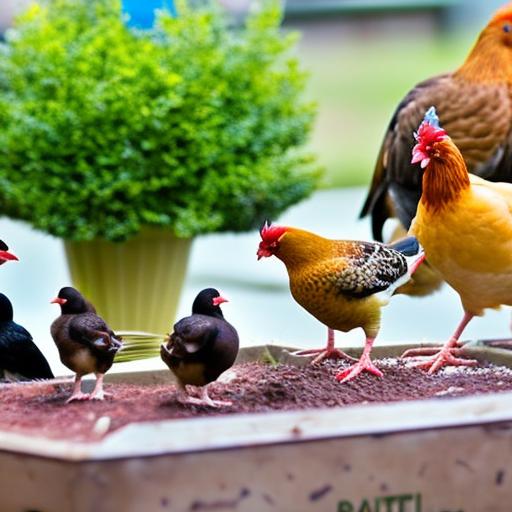Keeping chickens in urban areas has become increasingly popular in recent years, and the city of Plymouth, Michigan is no exception. Urban chicken keeping refers to the practice of raising chickens in residential areas, typically in backyards or small gardens. This trend has gained traction due to the numerous benefits it offers, including a sustainable source of fresh eggs and meat, natural fertilizer for gardens, and educational opportunities for children.
Key Takeaways
- Keeping chickens in the city of Plymouth, Michigan is possible and legal with proper knowledge and preparation.
- Understanding local laws and regulations is crucial before starting to raise chickens in an urban area.
- Raising chickens in urban areas can provide benefits such as fresh eggs, natural pest control, and a fun hobby.
- Choosing the right chicken breeds for your city backyard is important to ensure their health and productivity.
- Building a chicken coop in your urban garden requires careful planning and consideration of space and materials.
Understanding the Local Laws and Regulations for Keeping Chickens in Plymouth
Before embarking on your urban chicken keeping journey in Plymouth, it is essential to familiarize yourself with the local laws and regulations regarding this practice. Researching the specific rules and restrictions in your area will help you avoid any legal issues and ensure that you are following all necessary guidelines.
In Plymouth, you may need to obtain permits or licenses to keep chickens legally. It is important to check with your local government or zoning department to determine the requirements. They will be able to provide you with information on any restrictions regarding the number of chickens allowed, coop size and placement, and noise regulations.
Benefits of Raising Chickens in Urban Areas
Raising chickens in urban areas offers a multitude of benefits for both individuals and communities. One of the primary advantages is having a sustainable source of fresh eggs and meat right in your backyard. By raising your own chickens, you can ensure that the eggs and meat you consume are free from hormones and antibiotics.
Additionally, chickens produce high-quality fertilizer that can be used to nourish your garden. Their waste is rich in nutrients and can be composted to create organic fertilizer. This not only reduces waste but also helps improve soil health and promotes sustainable gardening practices.
Urban chicken keeping also provides educational opportunities for children. By involving them in the care and maintenance of the chickens, they can learn about responsibility, animal husbandry, and where their food comes from. It can be a valuable hands-on learning experience that connects them to nature and fosters a sense of self-sufficiency.
Choosing the Right Chicken Breeds for Your City Backyard
When selecting chicken breeds for your urban backyard, there are several factors to consider. First and foremost, you should choose breeds that are well-suited to urban environments. These breeds should be relatively quiet, adaptable, and able to thrive in smaller spaces.
Some recommended chicken breeds for urban areas include the Rhode Island Red, Australorp, and Sussex. These breeds are known for their docile temperaments, good egg production, and ability to adapt to various climates. They are also relatively quiet compared to other breeds, making them ideal for residential areas.
It is also important to consider the size of your backyard when choosing chicken breeds. Smaller breeds or bantam varieties may be more suitable for limited space. Additionally, some breeds are better suited for colder climates, while others thrive in warmer regions. Researching and selecting the right breed for your specific location will ensure the health and well-being of your chickens.
Building a Chicken Coop in Your Urban Garden
Designing and building a chicken coop that fits your urban backyard is an important step in creating a safe and comfortable environment for your chickens. The coop should provide adequate space for the number of chickens you plan to keep, as well as protection from predators and the elements.
When designing your coop, consider incorporating features such as nesting boxes, roosting bars, and ventilation systems. These elements will ensure that your chickens have a comfortable place to lay eggs, perch at night, and have proper airflow to prevent overheating or moisture buildup.
Materials needed for constructing a chicken coop can vary depending on personal preference and budget. Common materials include wood, wire mesh, and roofing materials such as shingles or metal sheets. It is important to use sturdy materials that can withstand the elements and provide adequate protection for your chickens.
Feeding and Caring for Your City Chickens

Proper nutrition is essential for the health and well-being of your city chickens. A balanced diet should include a combination of commercial chicken feed, fresh fruits and vegetables, and access to foraging opportunities.
Commercial chicken feed is formulated to provide the necessary nutrients for optimal egg production and overall health. It is important to choose a feed that is appropriate for the age and breed of your chickens. Additionally, supplementing their diet with fresh fruits and vegetables can provide additional vitamins and minerals.
Daily care routines for city chickens include providing fresh water, cleaning the coop, and collecting eggs. Chickens should have access to clean water at all times, as dehydration can lead to health issues. Regularly cleaning the coop helps maintain a hygienic environment and reduces the risk of disease. Collecting eggs daily ensures that they are fresh and minimizes the chances of them being damaged or eaten by predators.
Managing Chicken Waste and Odor in Urban Areas
Managing chicken waste and odor is an important consideration when keeping chickens in urban areas. Proper waste management not only helps keep your backyard clean but also reduces potential conflicts with neighbors.
Composting chicken waste is an effective way to manage it while also creating nutrient-rich fertilizer for your garden. Chicken manure can be composted along with other organic materials such as leaves, grass clippings, and kitchen scraps. The composting process helps break down the waste into a usable form while reducing odor.
Regular coop maintenance is also crucial in minimizing odor in urban areas. Cleaning the coop regularly, removing soiled bedding, and providing proper ventilation can help prevent the buildup of ammonia and other odors associated with chicken waste.
Dealing with Predators and Other Risks in the City
Urban areas may present unique challenges when it comes to protecting chickens from predators and other risks. Common predators in urban areas include raccoons, foxes, and neighborhood cats. It is important to take measures to secure your coop and run to prevent access by these animals.
Some strategies for protecting chickens from predators include using sturdy fencing, burying wire mesh around the perimeter of the coop to prevent digging, and installing motion-activated lights or alarms. Additionally, providing a secure coop with a lockable door can help keep chickens safe at night when predators are most active.
Other risks in the city may include noise complaints from neighbors or zoning violations. To minimize potential conflicts, it is important to maintain a clean and odor-free coop, follow local regulations regarding noise levels, and be considerate of your neighbors’ concerns.
Connecting with the Local Urban Chicken Community in Plymouth
Joining local chicken groups and attending events and workshops can be a great way to connect with the urban chicken community in Plymouth. These groups often provide valuable resources, support, and networking opportunities for urban chicken keepers.
Local chicken groups may organize events such as coop tours, workshops on chicken care and maintenance, or even chicken swaps where you can exchange or purchase chickens from other enthusiasts. These events provide opportunities to learn from experienced chicken keepers, share knowledge and experiences, and build a sense of community.
Enjoying the Rewards of Urban Chicken Keeping in Plymouth, Michigan
Keeping chickens in the city of Plymouth, Michigan offers numerous benefits for individuals and communities alike. From fresh eggs and meat to natural fertilizer for gardens, urban chicken keeping provides a sustainable and rewarding experience. By understanding the local laws and regulations, choosing the right breeds, building a suitable coop, and providing proper care for your chickens, you can enjoy the many rewards that come with this practice. So why not give it a try? Start your urban chicken keeping journey today and reap the benefits of this fulfilling and sustainable hobby.
If you’re considering keeping chickens in the city of Plymouth, Michigan, you may also be interested in learning about how many eggs geese lay. Poultry Wizard has a helpful article on this topic that provides insights into the egg-laying habits of geese. Understanding the egg production of different poultry species can help you make informed decisions when it comes to raising backyard birds. To read more about this, check out the article here. Additionally, if you’re looking for a suitable chicken coop for your feathered friends, Producers Pride Sentinel Chicken Coop is worth considering. Find out more about this coop and its features in the article here. Lastly, if you have an old shed that you’d like to repurpose into a chicken coop, Poultry Wizard has a guide on how to do just that. Discover the steps involved in turning a shed into a functional and comfortable chicken coop by clicking here.
FAQs
Can you keep chickens in the City of Plymouth, Michigan?
Yes, you can keep chickens in the City of Plymouth, Michigan, but there are certain regulations that must be followed.
What are the regulations for keeping chickens in the City of Plymouth?
According to the City of Plymouth’s zoning ordinance, residents are allowed to keep up to six chickens on their property as long as they are kept in a secure coop or enclosure and are at least 25 feet away from any neighboring homes.
Do I need a permit to keep chickens in the City of Plymouth?
No, you do not need a permit to keep chickens in the City of Plymouth as long as you follow the regulations set forth in the zoning ordinance.
What types of chickens are allowed in the City of Plymouth?
There are no specific restrictions on the types of chickens that are allowed in the City of Plymouth, but residents should ensure that their chickens are not causing a nuisance to their neighbors.
What are the penalties for violating the regulations for keeping chickens in the City of Plymouth?
Residents who violate the regulations for keeping chickens in the City of Plymouth may be subject to fines or other penalties. It is important to follow the regulations to avoid any legal issues.
Meet Walter, the feathered-friend fanatic of Florida! Nestled in the sunshine state, Walter struts through life with his feathered companions, clucking his way to happiness. With a coop that’s fancier than a five-star hotel, he’s the Don Juan of the chicken world. When he’s not teaching his hens to do the cha-cha, you’ll find him in a heated debate with his prized rooster, Sir Clucks-a-Lot. Walter’s poultry passion is no yolk; he’s the sunny-side-up guy you never knew you needed in your flock of friends!







